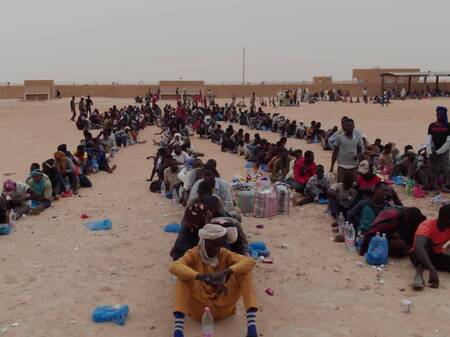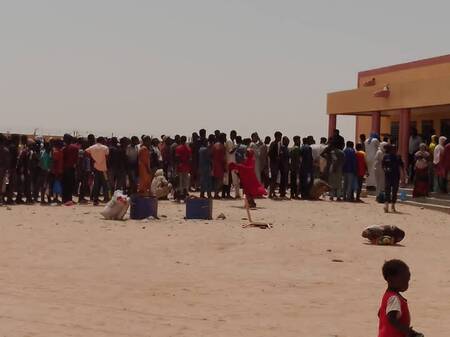During the months of August and September 2022, at least 4747 people were deported from Algeria to Niger, according to Alarme Phone Sahara's whistleblowers in Assamaka, the Algerian-Nigerian border. The number of people deported since the beginning of 2022 is now at least 17105.


Deportees in Assamaka, Niger, August 2022 © Alarme Phone Sahara
Left in the desert. The unofficial deportations convoys of 14th of August, 2nd September and 17th of September 2022
The people deported in the "unofficial" convoys, mostly not Nigeriens, but nationals of other countries, are always left at "Point Zero" in the border area between Algeria and Niger, in the middle of the desert. The deportees have to walk 15 kilometres through the desert to reach Assamaka, the first Nigerien town after the Algerian border. With this practice, Algerian security forces always put the lives of deportees at risk.
According to descriptions of deportees and drivers, transport in unofficial deportation convoys takes place under very harsh and violent conditions:
Transport from detention centres in the northern cities of Algeria, such as Oran or Algiers, to Tamarasset in the south in buses escorted by the national police.
According to many testimonies of deportees, it is common for mobile phones, cash and all personal belongings to be taken away before transport.
From Tamanrasset to Point Zero on the border with Niger, people are loaded into trucks where they have to stay in the back of the truck for hours, squeezed together, with no opportunity to sit properly, with very few breaks, with insufficient food and water supplies, and no possibility of going to the toilet. Violence by security forces is common in detention centres and also during transport.
Alarme Phone Sahara whistleblowers in Assamaka, Algerian-Nigerian border, report:
14th of August 2022: 730 deportees in an unofficial expulsion convoy, among them 13 women, 10 minor boys, 2 minor girls and 705 men, arrived in Assamaka on foot, after Algerian forces had dropped them off at Point Zero 15km from Assamaka.
Once again, the largest groups of deportees were 220 Guineans and 255 Malians. Among them were 9 nationals from Chad, 27 from Gambia, 40 from Sudan, 23 from Burkina Faso, 45 from Ivory Coast, 21 from Senegal, 21 from Cameroon, 12 from Benin, 17 from Nigeria, 17 from Sierra Leone, 2 from Niger itself, 2 from Togo, 9 people from Liberia, 3 from Guinea Bissau and one from Ghana.
In addition, and very unusual for previous years' experiences, there were 4 Egyptians and 3 Yemenis who could not stay on Niger territory, but were sent back to Algeria by the Niger border police.
02nd of September 2022: 774 deportees in an unofficial deportation convoy, among them 5 women, 1 minor boy, 3 minor girls and 765 men, arrived in Assamaka on foot,
The largest groups of deportees were again 230 Guineans and 257 Malians. Besides them, there were 66 nationals from Chad, 28 from Gambia, 84 from Sudan, 16 from Burkina Faso, 27 from Ivory Coast, 6 from Senegal, 11 from Cameroon, 27 from Benin, 4 from Nigeria, 11 from Sierra Leone, 3 from Liberia and one from Ghana.
According to the whistleblowers of Alarme Phone Sahara, it is still possible that the real number of deported people is quite higher than those who were registered in Assamaka.
17th of September 2022: 669 deportees in an unofficial deportation convoy, among them 7 women, 4 minor boys, 1 minor girl and 657 men, arrived in Assamaka on foot,
The largest groups of deportees were again 166 Guineans and 286 Malians.
Besides them were 6 nationals from Chad, 21 from Gambia, 21 from Sudan, 37 from Burkina Faso, 22 from Ivory Coast, 27 from Senegal, 25 from Benin, 19 from Nigeria, 14 from Cameroon, 14 from Sierra Leone, 3 from Liberia, 4 from Togo and 2 from Niger, one person from Guinea Bissau and one from Mauritania.
Official deportation convoys of 16th of August, 04th of September and 19th of September 2022
The official deportation convoys take place on the base of a deportation agreement between Algeria and Niger signed in 2014. The people deported in these convoys are generally citizens of Niger. Unlike the unofficial convoys, these people are taken directly to the city of Agadez or Arlit.
Alarme Phone Sahara whistleblowers in Assamaka, Algerian-Nigerian border, report:
16th of August 2022: Arrival of an official deportation convoy with 736 Nigerien citizens, including 63 women, 90 minor girls, 74 minor boys and 509 men.
04th of September 2022: Arrival of an official deportation convoy of 16 trucks with 822 persons. 798 were Nigerien citizens, including 63 women, 65 minor girls, 90 minor boys and 580 men. In addition, 24 nationals of other countries were deported in the same convoy: 11 people from Nigeria, 3 from Cameroon, 9 from Mali and one person from Ivory Coast.
19th of September 2022: Arrival of a large official deportation convoy with 1016 Nigerien citizens, including 83 women, 109 minor girls, 120 minor boys and 704 men.
Systematic disregard for the rights of children and minors
The figures show, among other things, that there were at least 569 minor girls and boys deported from Algeria to Niger during the two months of August and September 2022; the vast majority of these young people are Nigerien citizens deported in official convoys. This very high figure is again worrying, given that cases of abuse and separation of children from their parents are regularly reported in deportation convoys from Algeria to Niger. In the deportation practices of the Algerian state, disregard for the rights of children and the particular vulnerability of children and minors is systematic.
Assistance to deportees with the Alarme Phone Sahara tricycle
During deportation convoys from Algeria, deportees are transported for days, crammed into buses and the back of trucks, in the heat and cold, through the desert. Those deported by unofficial convoys and abandoned in the desert in the border area have to walk 15 km to Assamaka on the Niger side. Regularly, people are brutally abused by Algerian security forces. Many deportees therefore arrive in Assamaka ill and injured.
In case of need, the Alarme Phone Sahara team in Assamaka transports these sick and injured deportees from the police station to the local health centre, with the permission of the police officer in charge.
Stranded in Niger at a time of deepening misery
According to reports from Alarme Phone Sahara's whistleblowers, conditions for deportees and the migrant population have worsened in all the different towns in northern Niger in the face of a general situation of aggravated misery triggered by, among other things, shortages and a massive increase in the price of food on the world market. In this precarious survival situation, thousands of people, often victims of deportation or forced return from Algeria or Libya, remain stranded in Niger with no means to continue their migration project or to return to their countries of origin.
In light of this situation, Alarme Phone Sahara demands:
- Deportations from Algeria, Libya and other countries must be stopped.
- The deportation agreement between Algeria and Niger, and all deportation agreements, must be cancelled.
- IOM must use its resources to support deportees who reallly wish to return to their countries of origin.
- Support for migrants in distress must be guaranteed unconditionally and must not depend on accepting so-called "voluntary return".
- The IOM must ensure that those received in its centres are provided with decent living conditions, including food supply, medical care, hygiene and accommodation.
- The state of Niger must continue to support its citizens who are deported from Algeria and other countries to return to their regions and communities of origin instead of abandoning them in conditions of distress.
- Countries in the sub-region should support their citizens who really wish to return without complication.
- Stop the policies of outsourcing European borders on African soil!
- No to the new "working agreement" between FRONTEX and EUCAP Sahel Niger which aims to intensify the criminalisation and persecution of migration under the pretext of "combating migrant trafficking".

